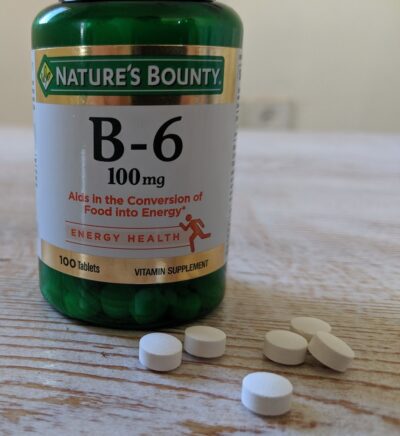In this article I describe the effects on sleep, dreams, lucid dreaming, and OBEs of vitamin B6, also known as pyridoxine.
Vitamin B6 (pyridoxine) is a very promising supplement for sleep induction and more importantly: for dream enhancement. In this respect, it is right up there with supplements such as melatonin. The problem with vitamin B6 is however that the science behind its effects on sleep is shaky.
There are few properly conducted scientific studies on it, and what there is out there in this regard has thus far yielded contradictory results. That said, anecdotal evidence behind the effects of B6 on dreams is plentiful. Despite slow progress and less than satisfactory results, science has untangled a few of the intricacies behind these anecdotal – but apparently very real – effects.
Takeaways:
- Vitamin B6 (pyridoxine) promotes dream recall, as well as dream vividness, color, and intensity.
- Scientific evidence in this regard is not exactly convincing for the time being.
- Researchers have not yet agreed on the mechanism of action of vitamin B6 on dream recall.
- Vitamin B6 is considered an essential supplement for lucid dreaming and for OBEs like those attained through astral projection.
- It is possible to overdose on vitamin B6.

The Ebben Study of 2002
A study concerning the effects of pyridoxine on sleep- and dream quality, by the City College of New York in 2002, is the scientific cornerstone of our current understanding of the matter. Despite its shortcomings, the said study delivered some much-needed evidence that does indeed support anecdotal observations.
What exactly did the Ebben Study prove?
The aim of the study was to verify observation-rooted assumptions concerning the ability of vitamin B6 to enhance dream recall and the dream experience. Obviously, due to the self-reported methodology used in the experiment, its assessments were perception-based.
The study made heavy use of the concept of dream salience, which describes the subjective intensity of the dream experience.
Defined in 1974, the Dream Salience Hypothesis uses a number of factors, such as vividness, bizarreness, emotionality, and color, to provide a sort of scale against which the quality of the dream experience can be measured. It is obviously subjective in nature.
Another problem with dream salience is that it can, in and of itself, influence its own results. Dreams that are more salient automatically carry a bigger psychological importance for the dreamer. Therefore, they are obviously easier to remember too.
The study used a minute sample of 12 people (6 men and 6 women). Each test subject was subjected to three stretches of 5-day long treatments consisting of vitamins of different doses/placebo administered 5 minutes before going to sleep. The study subjects all went through all 3 treatment-phases: placebo, 100 mg of pyridoxine and 250 mg of pyridoxine.
Subjective sleep logs were used to record the results.
The results of the Ebben study showed a clear increase in Composite Dream Salience scores, triggered by the 250 mg dose, compared to placebo. The effects were dose dependent.
Although the 100 mg dose did not elicit statistically significant differences the way the 250 mg dose did, it did increase the Composite Dream Salience score too, compared to placebo.
Conclusions drawn from the Ebben Study
The question raised by the above detailed findings is: to what can these effects be attributed? Explanations in this regard abound.
- Vitamin B6 has been found to improve memory. Its effects on dream recall could indeed be written down to that.
- The neuro-chemical theory is backed by evidence as well. Pyridoxine is needed for the conversion of tryptophan to 5-hydroxytryptophan, and then further, for the conversion of 5-HTP to serotonin. Serotonin however suppresses the REM stage of sleep…how does B6 promote dream experience through this path then?
Apparently, following the initial suppression of REM sleep, a rebound effect happens, which deepens the REM cycle, thus promoting dreaming in general. This rebound effect would come into the picture during the last few hours of sleep. That explains why dream recall is enhanced in such cases too.
Several studies support this hypothesis. It is well known that acute administration of vitamin B6 results in increased serotonin synthesis in the brain. Also, administration of 100 mg of B6 at 5 PM was proven to extend the REM sleep stages.
A word of caution
Some have speculated that the B6-5-HTP link may carry hidden dangers. The two supplements should not be taken together, because it may lead to the formation of serotonin in the gut instead of the brain. On one hand, such serotonin goes to waste, given that it cannot cross the blood brain barrier. On the other, it may cause heart damage, circulating in the blood.
Whether this is true or not is debatable. Even at best though, taking the two supplements together offers no advantages whatsoever.
The same applies to the concurrent taking of B6 and L-DOPA supplements (like Mucuna pruriens).
- Sleep interruption is yet another theory attempting to explain the mechanics by which B6 impacts dream recall. According to this theory, high doses of vitamin B6 may cause sleep interruptions. Thus, they generate opportunities for short-term dream memories to be transferred to long-term memory.
The Ebben study however does not provide sufficient evidence in this regard.
A 2018 study in Australia, by the University of Adelaide, attempted to recreate the results of the Ebben study. It also explored the effects of a vitamin B complex formula on sleep and dreams.
This study used a much larger sample size (some 100 people took part in it) and it explored the impact of pyridoxine hydrochloride on dreams, with lucid dreaming in mind. It used 240 mg of vitamin B6, placebo, and a vitamin B complex formula, which included a dose of 240 mg of vitamin B6. In addition to it, it also included vitamin B1, B3, B5, B7, B9, and B12, but not vitamin B2 (Riboflavin), which colors urine and is therefore readily detectable.
Participants recorded a much wider range of variables as part of this study. These variables included Dream Recall Frequency, Dream Count, Dream Quantity, Vividness, Bizarreness, Color, Time Awake during the night, Sleep Quality and Tiredness upon waking up.
Surprisingly, Dream Recall Frequency and Dream Count were the same for the placebo group and the pure B6 group.
A statistically significant difference between the two test groups was observed in the Dream Quantity category, which effectively quantified the amount of dream content recalled by participants.
Researchers drew the conclusion that vitamin B6 could indeed be used for dream enhancement.
Dream color, Vividness and Bizarreness also failed to produce statistically significant differences between the placebo and the B6 groups however, seemingly invalidating that conclusion. Furthermore, these results contradicted the findings of the Ebben study.
What was the reason behind this unexpected turn of events? After all, in the Australian study, B6’s impact on the overall dream experience was much less significant than in the Ebben study.
A logical explanation would be that the study participants had already been sufficiently supplemented with the vitamin through their diet. Vitamin B6 deficiency is extremely rare in Australia. Many foods (such as bread and various cereals) are supplemented with B6. It makes sense that for test subjects already “laden” with B6, additional supplementation would not elicit a significant impact.
After all, poor dream recall is considered a symptom of vitamin B6 deficiency. If there is no deficiency, then there is no poor dream recall and consequently, there is much less room for improvement in this regard.
Another interesting twist resulting from the Australian study was the lack of impact of the B complex concoction. Apparently, it had no effect on dreaming whatsoever. This happened despite the fact that it featured the same dose of vitamin B6 as the pure B6 capsule.
A logical explanation in this regard would be that some other component of the B complex formula counteracted the effects of B6. Exactly how this counteraction worked and which component was responsible for it, was unknown and the study did not yield any conclusions in this regard.
What we do know is that vitamins B1, B3, B5 and B9 all have a role in serotonin synthesis. Vitamin B1 in particular is thought to increase REM sleep, by acting on tryptophan conversion.
The study also concluded that vitamin B6 supplementation did not negatively affect sleep quality. On the other hand, the complex formula did just that. Vitamin complex formulations do indeed tend to have such an effect on sleep in general.
Yet another takeaway from the study was that the theory concerning vitamin B6 supplementation and sleep disruptions was most likely not valid. No significant differences in sleep quality were found between the B6 group and the placebo group.
On the other hand, the REM rebound effect theory was not disproven. In fact, the study ended up recommending more research in that direction.
Vitamin B6 may indeed act synergistically with other B vitamins towards dream enhancement. Complex formulations do not work in this regard however. More research is warranted in this direction as well.
Link between vitamin B6, dream salience and lucid dreaming
If vitamin B6 is indeed an efficient promoter of dream salience, it may have a role as a supplement in the induction of lucid dreams. Dream salience describes a combination of psychological conditions that facilitate dream recall. Such conditions are also conducive to lucid dreaming.
Why is this role of vitamin B6 potentially important?
Lucid dreaming is much more than a mental exercise in which hardcore oneiranouts like to dabble. It is a very real phenomenon, the potential applications of which are almost limitless.
In the area of dream research, lucid dreaming would be an all-powerful tool. It could also be used for the treatment of nightmares, to great effect. Rehearsing and practicing skills in a lucid dream environment would also be a option. Last, but certainly not least, lucid dreaming would open up infinite possibilities in regards to entertainment, recreation, and creative problem-solving.
Lucid dreaming is most definitely a vertical worthy of a lot of scientific attention. Efforts in this regard are severely limited by the lack of reliable lucid dream induction techniques. Vitamin B6 could prove to be an aiding element in such a technique.
Vitamin B6 as an alternative to sedative drugs
Above and beyond dream research, vitamin B6 might provide a healthier alternative to sedation.
A 2017 study done in Italy confirmed the possible usefulness of vitamin B6 as a companion solution for melatonin treatment, in the induction of spontaneous sleep in toddlers/children.
The said study focused on ABR, an auditory response test performed on children under the age of 4-5. Such young children are often uncooperative. This means that medical staff is often forced to resort to sedation.
According to the findings of the study, melatonin worked well for the spontaneous induction of sleep in such children – as expected. Furthermore, researchers have found that adding tryptophan and vitamin B6 to melatonin resulted in even better sedation and testing conditions.
The use of such a solution could generally save costs as well as address parental anxiety to some degree. The study concluded that B6 was certainly an avenue worth exploring in this regard.
Vitamin B6 and nightmares
The relationship between vitamin B6 and nightmares is an interesting one. Because it promotes dreaming and supposedly enhances the vividness and color of dreams, vitamin B6 may be considered a promoter of nightmares. After all, nightmares are dreams too. They just stem from different psychological states than their more amiable peers.
On the other hand, as mentioned, vitamin B6 also promotes lucid dreaming. Lucid dreaming is a very promising avenue for the treatment of nightmares, so therein lies the vitamin B6 contradiction.
Based solely on anecdotal reports, we can however conclude that taking vitamin B6 before sleep might bring about nightmares later in the night.
Vitamin B6 and out-of-body experiences
Out-of-body experiences (OBEs) are altered states of consciousness, not unlike lucid dreaming. Since vitamin B6 promotes a sort of psychological condition conducive to lucid dreaming, it is safe to surmise that it also promotes OBEs, such as astral projection.
Obviously, scientific evidence is scant in this regard at best. That said, several Astral Projection portals have listed B6 as an essential supplement, together with galantamine, Huperzine A, melatonin, and choline.
If you are an AP enthusiast and you are not afraid of nightmares, by all means, make sure that your vitamin B6 levels are sufficiently high when attempting to slip into such a state.
Remember that you may not gain a noticeable “boost” out of B6, if you are already sufficiently supplemented with it, but you need it nonetheless.
Start off a smaller dose, like 100mg. Gradually work your way up to 250 mg, but do not exceed it. You can actually overdose on this vitamin.
Vitamin B6 sources
How can you make sure that you do indeed get a sufficient dose of vitamin B6? When it comes to dream enhancement/potentiating, supplements are obviously your best bet.
Other than that, you should be aware that vitamin B6 is an essential nutrient, needed for the synthesis of various neurotransmitters.
It will elevate mood, improve sleep, prevent panic attacks, and it may even have a role in the prevention of Parkinson’s disease. Proper dietary intakes of the vitamin are therefore essential.
Which foods contain higher levels of vitamin B6?
The richest sources of vitamin B6 are organ meats, such as liver, heart etc. Fish, poultry, and pork can all be included in this category. Unfortunately, these foods as well as eggs come with an unwanted “baggage,” including saturated fats and cholesterol.
Then we have wholegrain cereals and bread, various vegetables and fruits, potatoes, soybeans, peanuts etc. As far as vegetables go, dark leafy veggies, such as spinach, kai lan, and broccoli are your best B6 sources. Fruits-wise, avocados and bananas are your best choice in this regard.
If your diet is a fairly balanced one, you really do not need to bend over backwards to satisfy your normal daily B6 needs.
Adult males need about 1.4 mg each day, while females need 1.2 mg. Anything above that can be jotted down as “supplementation.”
You can see that the doses recommended for dream enhancement are much higher than that (from 50 mg to 250 mg).
Vitamin B6 side effects
While vitamin B6 is indeed an essential vitamin, it is possible to overdose on it. A daily dose of 200 mg, taken for an extended period of time (months on end), can lead to peripheral neuropathy. This is a condition affecting the nervous system, which results in loss of feeling in the limbs. Once the B6 overdosing is discontinued, symptoms usually subside. Sometimes however, they can become permanent.
Prolonged administration of high doses of pyridoxine can also lead to other forms of neuropathy. Extreme skin sensitivity, bone pain, numbness, and muscle weakness are all possible.
Other, shorter-term side effects of B6 overdosing are insomnia and cramps.
The bottom line
Vitamin B6 is an essential vitamin, which looks like a promising sleep/dream-modulating supplement.
The doses needed to achieve dream enhancement are rather high, so make sure you do not abuse it in this regard.
The scientific evidence currently backing the anecdotal reports of B6-generated dream enhancement is rather shaky and unconvincing. Science is not entirely certain by which mechanism pyridoxine acts upon dream recall either.
Check Availability (Amazon.com)
Pick up your B6 supplement right now, and delve into the realm of dreams one step closer to achieving on-demand lucidity.


